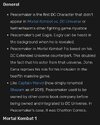In fiction, I generally follow certain rules when deciding what is canon.
Canon rules:
- All officially licenced material made to fit within a universe is canon.
- If it is contradicted by a higher form of media (the main media of whatever universe it is), then it is non-canon.
- If it is stated non-canon by a proper source, then it is non-canon (except in rare instances).
- Parodies are most likely non-canon due to their nature. It has to be intended to fit within said universe.
- If it is only connected by easter eggs, it is most likely non-canon unless there is some clear intent.
So, let's apply this logic in some other places, right? Including some crossovers.
X-Men: Days of Future Past: The Rogue Cut (to X-Men)
-contradicts Apocalypse.
-stated non-canon officially.
Ruling: NON-CANON
Dead by Daylight Saw Chapter (to Saw)
-Audio set within the existing Saw timeline and builds on it.
-Officially licenced by rights holders.
Ruling: CANON
Spider-Man: The New Animated Series (to Spider-Man 2002-2007)
-Spider-Man 2 contradicts it.
-It is given a separate reality number.
Ruling: NON-CANON
Blade Runner (to AVP)
-Shared props.
-Easter eggs.
-Not licenced by rights holders.
-Easter eggs confirmed to be a joke.
-Somewhat approved by director but not really.
Ruling: NON-CANON
Stranger Things x Teenage Mutant Ninja Turtles (to ST)
-Officially licenced by rights holders.
-Made to fit into established timeline of the show.
-Doesn't contradict.
-Leads on from S2, leads into S3.
Ruling: CANON
(might be canon to the Mirage TMNT comics)
Justice League vs Godzilla vs Kong (to MonsterVerse)
-Officially licenced by rights holders.
-Multiversal, so fits into established timeline of the films.
-Doesn't contradict.
-Stated to be part of the MonsterVerse.
Ruling: CANON
Watch_Dogs (to Assassin's Creed)
-Officially licenced by rights holders.
-Fits into the timeline.
-Crossover characters.
-Stated non-canon by rights holders.
Ruling: NON-CANON
(canon if not for idiotic statements)
Agents of S.H.I.E.L.D. (to Marvel Cinematic Universe)
-Officially licenced by rights holders.
-Stated canon.
-Stated non-canon
(unreliably by Gunn, XD).
-Fits into established timeline.
-Doesn't contradict.
-Is referenced by other media that is confirmed canon, as well as reference sites.
-Has character crossovers.
Ruling: CANON
Fortnite (to everything)
-Officially licenced.
-No story to most appearances.
Ruling: NON-CANON
(except with story-based content, I'd say they're all variants. You can't fit something on a timeline if it doesn't even exist.)
So, let's apply these rules to Mortal Kombat 1.
Peacemaker DLC (to DCEU)
-References The Suicide Squad and Peacemaker events.
-Is voiced by John Cena.
-Doesn't contradict the DCEU and, likely, never will.
-Is officially licenced by rights holders.
Ruling: CANON*
*Most MK endings aren't necessarily canon, so this could be discounted.
This are just my own reasons on how I consider things by the way. Not everyone has to follow it, but it's how I think.
You don't have to include it on the timeline of course. The very nature of it is understandably ambiguous and it could just as easily be a variant of the DCEU. I just wouldn't be so quick to throw on a Hypertime explanation when there is no reason to think that that is the official reasoning. You could throw that explanation on literally every piece of media ever, including direct sequels. Makes more sense to call it an alternate universe with a similar history at that point.
My main issue is the random acceptance of it being connected to MKvDC due to some fan wiki to be honest. That was pretty silly.


